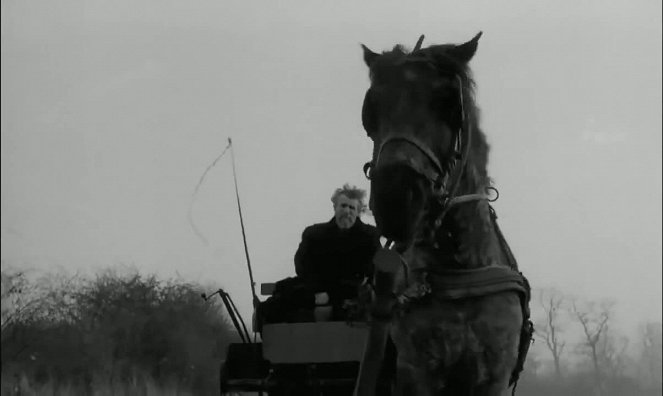Opisy(1)
Punktem wyjścia Konia turyńskiego jest anegdota o Fryderyku Nietzschem, który w 1889 roku pochylił się nad losem konia bitego przez chłopa przy drodze. Filozof obejmuje zwierzę za szyję i płacząc, popada w obłęd, który na zawsze oddzieli go od świata. Akcja rozgrywa się w ciągu sześciu dni w ciemnej, wiejskiej chacie, a całość układa się w spójną, przytłaczającą wizję końca świata. (Nowe Horyzonty)
(więcej)Recenzje (3)
I don't think I'm just mainstream oriented. I am able to watch any movie. Whether mainstream or artistic. Anyway, with the artistic ones, I find it difficult to find a note that suits me, so I usually switch off the film. One night I couldn't fall asleep, so I watched The Turin Horse. I was curious how such a film, which was said to be one of the best films of 2011 on ČSFD, looks like. And it looks pretty weird. It's hard to describe. There is not much talking, the environment speaks for itself. I think everyone has something in them that can captivate them even in such films. For me, it was, for example, Stalker, which I liked and honestly I don't know exactly why. The Turin Horse is quite similar and I couldn't stand it.
()
Béla Tarr, like Nietzsche once did, touched his horse and was speechless. The Turin Horse is not a film ABOUT the Turin horse, it IS the Turin horse. A narratively parched image of a world in which nothing remains but despair, automatism, and emptiness. An intellectually monolithic image of a fading world from which meaning and hope depart as the last sigh. All that remains is the darkness, the gale, and the dictation of nothingness that mankind has brought onto itself. Along with Tarr's personal myth, The Turin Horse is one of the great achievements of contemporary art, Gesamtkunstwerk in an almost forgotten traditional sense, the narrative termination of the contract with the viewer and the world, the undiluted stumbling towards the final darkness. A film that resonates, and I daresay it will one day be one of the great reflections of the end of civilization.
()
Béla Tarr is simply not a filmmaker I could ever like. His style of filmmaking is too poetic, it's too much of a parable that ultimately tells me nothing. It's hard to finish the film because you feel like it's about nothing. Nevertheless, in his films, you'll find scenes that might even make you think. I don't think I'll be watching any more of his films.
()

